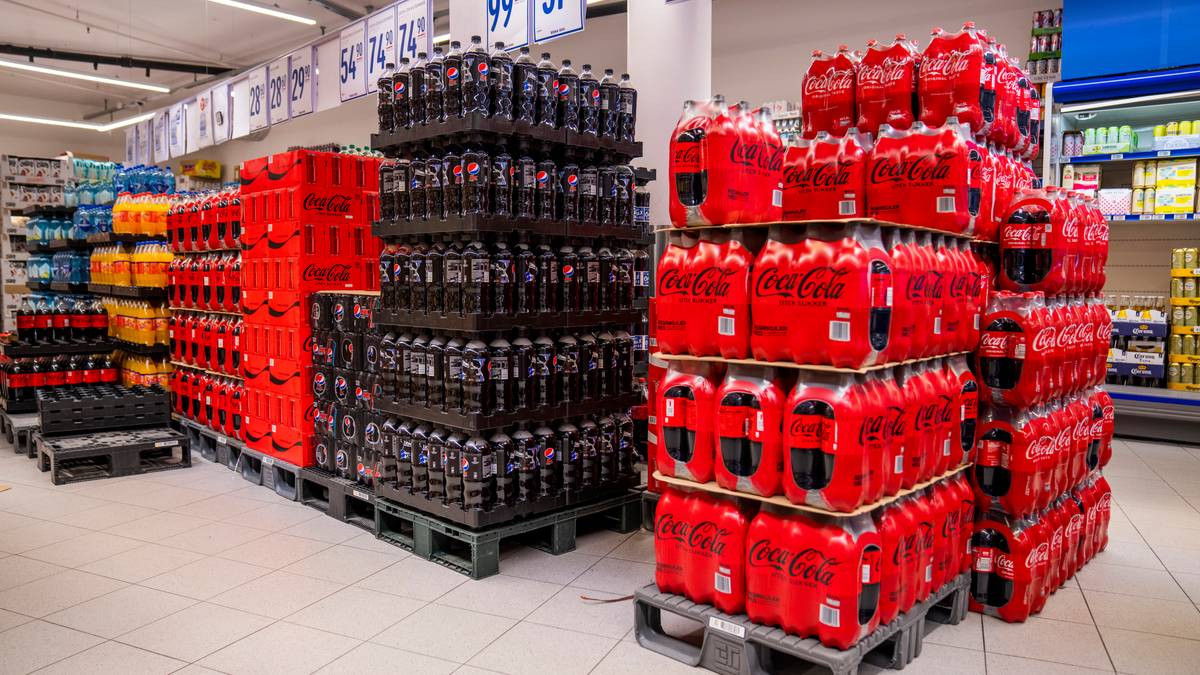– We do not advise manufacturers to withdraw products and we do not advise consumers to stop using them completely. We recommend some moderation, says WHO Director of Nutrition and Food Safety Francesco Branca.
World Health Organization (WHO) Publication of the results of risk assessments On the health effects of the artificial sweetener aspartame on friday night.
Since the 1980s, aspartame has been widely used in a number of foods and beverages, such as several types of soft drinks, yogurt, chewing gum, and sweetening tablets for coffee and tea.
The artificial sweetener aspartame should still be safe in recommended amounts.
The World Health Organization’s Division of Cancer Research based its assessment on available scientific evidence. The potential cancer risks apply specifically to liver cancer.
Three liters of soda
The World Health Organization confirms appreciation The amount most people take is safe.
Earlier this summer, the Norwegian Institute of Public Health (FHI) said that aspartame is safe in the amounts we eat in Norway.
Both the United States and Europe decided the same. Since 1981, the World Health Organization’s Committee on Food Additives, Jefca, has said that aspartame is safe to use in certain amounts.
The US Food and Drug Administration (FDA) said in a statement that it does not agree that aspartame belongs to a probable carcinogen class. NBC News.
Aspartame is one of the most studied food additives in humans. Our researchers are not concerned as long as aspartame is used “under approved conditions,” says a statement from the FDA.
So the pre-set recommendation would remain for a maximum daily intake of 40 milligrams of aspartame per kilogram of body weight.
A 0.33 liter can of soft drink can contain 200-300 milligrams of aspartame.
Therefore, an adult weighing 70 kilograms must drink from 9 to 14 cans per day, or between three and five liters, to exceed this limit, as long as the person does not ingest aspartame from other foods and drinks.
Water is recommended
The controversy over aspartame has been going on for years, fueled in part by consumer activists in the United States and a handful of cancer researchers. Critical questions about the use of aspartame arose shortly after US health authorities approved the sweetener some forty years ago.

Francesco Branca at a press conference on Friday night, July 14, 2023.
The American consumer organization CSPI has long pushed for a professional evaluation of aspartame. It was only in 2022 that the World Health Organization decided to put the sweetener under the microscope.
– Branca said at the press conference: – If consumers are faced with a choice between drinking cola with artificial sweeteners or sugar, then I think a third option should be considered, which is to drink water to reduce the consumption of sweetening products.
More research is needed
In the report, the World Health Organization placed aspartame in Category 2b. It is the third lowest of four categories used by the World Health Organization’s International Agency for Research on Cancer:
- Group 1 – a substance carcinogenic to humans
- Group 2a – Possibly carcinogenic to humans
- Group 2b – Possibly carcinogenic to humans
- Group 3 – not classifiable
Level 2b is usually used when there is limited, but not conclusive, evidence of cancer in humans. If the evidence were strong, aspartame would be placed in a higher category.

Dr. Marie Schopur-Berigan of the World Health Organization’s International Agency for Research on Cancer (IARC) wants to research more into sweeteners.
The evidence is not of high quality or convincing enough. This is a call for the research community to study the sweetener further, says Dr. Marie Shobur-Berigan at the World Health Organization’s International Agency for Research on Cancer (IARC).
Cancer researchers believe the WHO announcement may provide an impetus for more research on aspartame.
“I don’t see how we can come to a conclusion on this without better research studies,” Professor Andy Smith at the University of Cambridge told Reuters news agency before submitting Friday’s report.
Criticism of the World Health Organization
Similar decisions by the World Health Organization, regarding other sweeteners, have previously led to lawsuits against manufacturers who have had to change recipes and switch to other alternatives.
The WHO has previously been criticized for its assessments being “confusing” to the public.
Scientists unrelated to the new WHO report call evidence that aspartame can be a weak carcinogen.
says Paul Pharoah, MD, a cancer researcher at Cedars-Sinai Medical Center in Los Angeles.
He says Jefca has not concluded that there is “convincing evidence” of health harms.
Pharaoh says most people shouldn’t be concerned about the risk of cancer associated with a chemical that has been placed in Group 2B by IARC.
The WHO conclusion “confirms once again that aspartame is safe,” says Kate Lowtman, president of the International Council of Beverage Societies.
Aspartame, like all other low- or no-calorie sweeteners, as part of a balanced diet, gives consumers the option to reduce their sugar intake, which is an important public health goal, says francis hunt wood, general secretary of the international sweeteners association.

“Organizer. Social media geek. General communicator. Bacon scholar. Proud pop culture trailblazer.”

